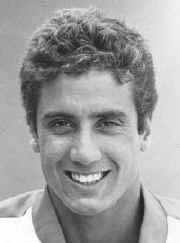
Pablo Morales (USA)
Honor Swimmer (1998)
FOR THE RECORD: 1984 OLYMPIC GAMES: gold (4x100m medley relay), silver (l00m butterfly, 200m individual medley); 1992 OLYMPIC GAMES: gold (l00m butterfly, 4x100m medley relay); FOUR WORLD RECORDS: 2-100m butterfly, 2-4xl00m medley relay); 1986 WORLD CHAMPIONSHIPS: gold (100m butterfly, 4x100m medley relay); 1983 PAN AMERICAN GAMES: silver (l00m butterfly); 1983 PAN PACIFIC CHAMPIONSHIPS: gold (200m butterfly); 1985 PAN PACIFIC CHAMPIONSHIPS: gold (l00m butterfly, 200m individual medley); 1987 PAN PACIFIC CHAMPIONSHIPS: gold (l00m butterfly), bronze (200m individual medley); WORLD SWIMMER OF THE YEAR: 1984; SEVEN U.S. NATIONAL CHAMPIONSHIPS: short course (l00y butterfly), long course (l00m butterfly, 4x100m medley relay); ELEVEN NCAA CHAMPIONSHIPS: 100y butterfly, 200y butterfly, 200y individual medley, 4xl00y medley relay); THREE NCAA WATER POLO CHAMPIONSHIPS: 1985,1986,1987.
He became known as the “Comeback Kid” in 1991 when, at the age of 27, returning from a three year hiatus, he still looked like a kid – lean body, innocent smile, and full of hope. He became the oldest Olympic gold medalist in swimming while at the 1992 Barcelona Olympics. It was the culmination of a long career filled with a lot of success and a little disappointment.
Having grown up in California, under the watchful eye of his Cuban immigrant parents, Pablo learned the traditional values of respect, hard work, love and sharing. Between swimming practices, at Santa Clara Swim Club with Coach Mitch Ivey, he gave volunteer service to hospitals, local kids groups and institutions for the elderly, and still managed to study hard and maintain a high grade point average. As an age group swimmer, he was a national record holder in the butterfly with a smooth natural stroke. As a teenager, he broke Mark Spitz’ 16 year old high school 100yd. butterfly record.
By 1984 he was swimming fast enough to qualify for the U.S. Olympic Team in three events, setting the world record in the 100m butterfly at the trials. At the Olympics in Los Angeles, he won the gold medal as a member of the 4 x 100m medley relay in the world record time of 3:39.30 with teammates Rick Carey, Steve Lundquist and Rowdy Gaines. He won silver medals in two other events, the 100m butterfly and the 200m individual medley, pushing Michael Gross of Germany in the butterfly and Alex Baumann of Canada in the individual medley, to world records. For his achievements, Pablo was named World Swimmer of the Year for 1984.
Between 1984 and 1988, Pablo swam to win, placing first at the 1985 Pan American Games in the 100m butterfly and 200m I.M.. At the 1986 Madrid World Championships he was the gold medalist in the 100m butterfly and 4 x 100m medley relay. His World Championship Trials’ time set the world record for the 100m butterfly at 52.84, a record which stood for almost 10 years until it was broken by Denis Pankratov of Russia in 1995.
In 1987, the nation saw the greatest achievement in the United States Collegiate Swimming history, when Pablo won his 11th NCAA National Championship title, one more than Hall of Famer John Naber of the University of Southern California, and a record which stands today. His Skip Kenny-coached Stanford University Team won its third consecutive National Championship with Pablo as team captain. Pablo also played on three Stanford NCAA Water Polo Championship Teams, one of a very few players to win national championships in these two disciplines.
However, after all this success, disappointment set in when Pablo, as the best butterfly swimmer in the world, failed to qualify for the 1988 US. Olympic Team at the Olympic Trials in Austin, Texas. Devastated, he retired from the sport but only temporarily. Three years later, in 1991, he returned to training, qualified for the 1992 U.S. Olympic Team as the “old man of the team” and came back to win the Olympic gold medal in the 100m butterfly in Barcelona.
Pablo Morales was always a team player who achieved individual success. When asked to have his picture taken at the 1987 NCAA Championship, Pablo responded “I only have my picture taken with my team.”
He is an athlete who exhibited a tremendous amount of sportsmanship to his competitors and a lasting impression of support to his teammates. His yearning desire to succeed was never diminished. His inspiration came from his mother and father, Bud Greenspan Olympic documentaries, and a popularity from his peers that was initiated by his own positive leadership qualities in which he lead by example. Following the 1992 Olympics, he was chosen the USOC Sportsman of the Year.
Pablo admired the Olympic experience where the best in the world come together to compete. Pablo Morales is the well respected swimmer who rose above the crowds of great competitors. In 1998, he will be putting these qualities together for others as the head coach for the San Jose State University Women’s Swimming Team in California.
